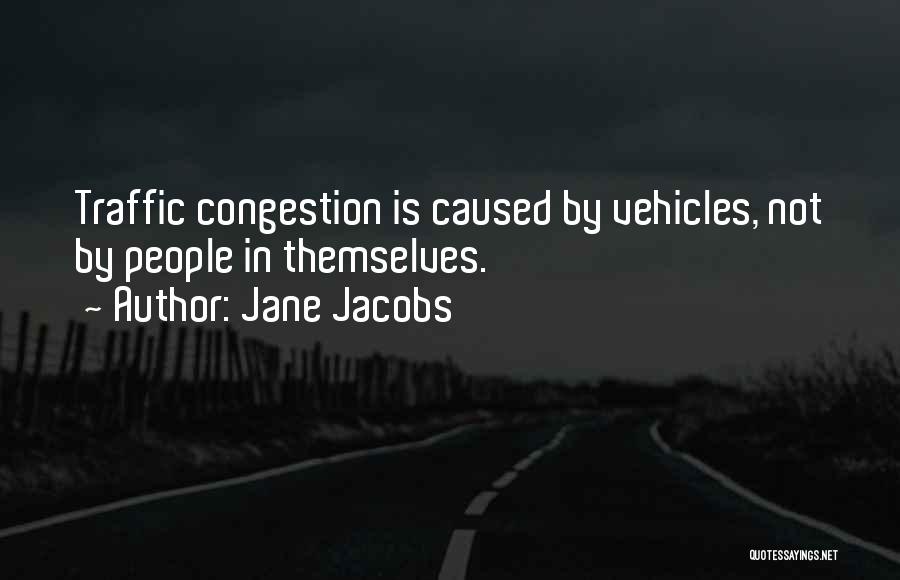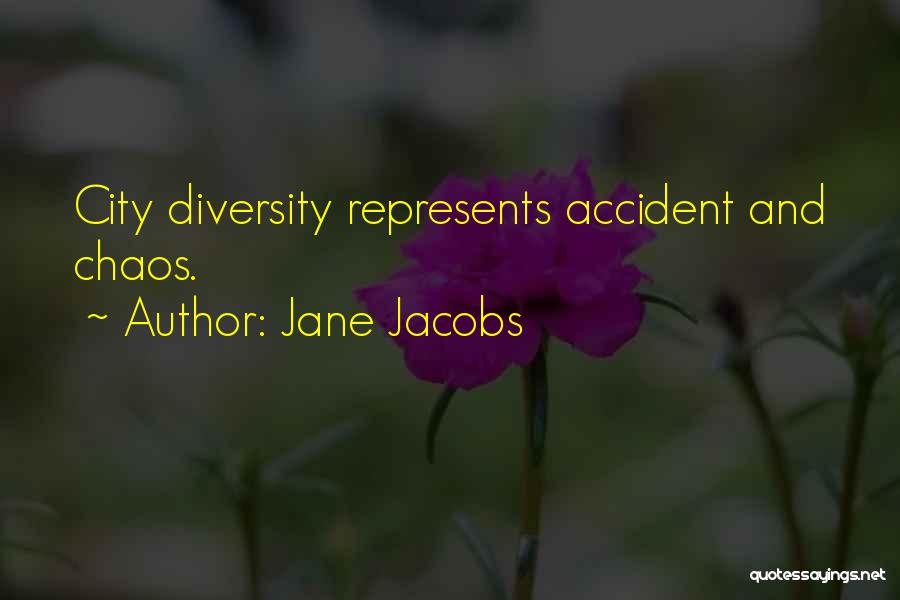Quotes & Sayings About Cities Jane Jacobs
Enjoy reading and share 52 famous quotes about Cities Jane Jacobs with everyone.
Top Cities Jane Jacobs Quotes
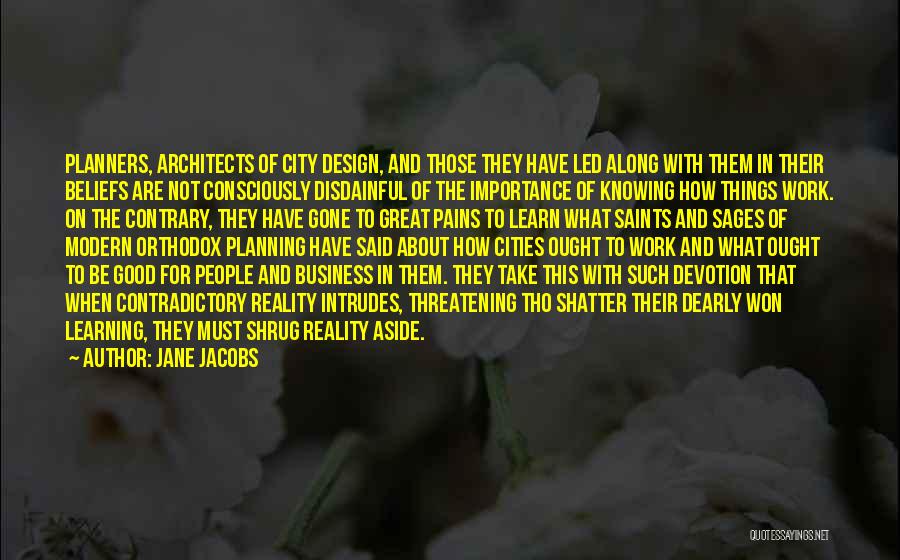
Planners, architects of city design, and those they have led along with them in their beliefs are not consciously disdainful of the importance of knowing how things work. On the contrary, they have gone to great pains to learn what saints and sages of modern orthodox planning have said about how cities ought to work and what ought to be good for people and business in them. They take this with such devotion that when contradictory reality intrudes, threatening tho shatter their dearly won learning, they must shrug reality aside. — Jane Jacobs
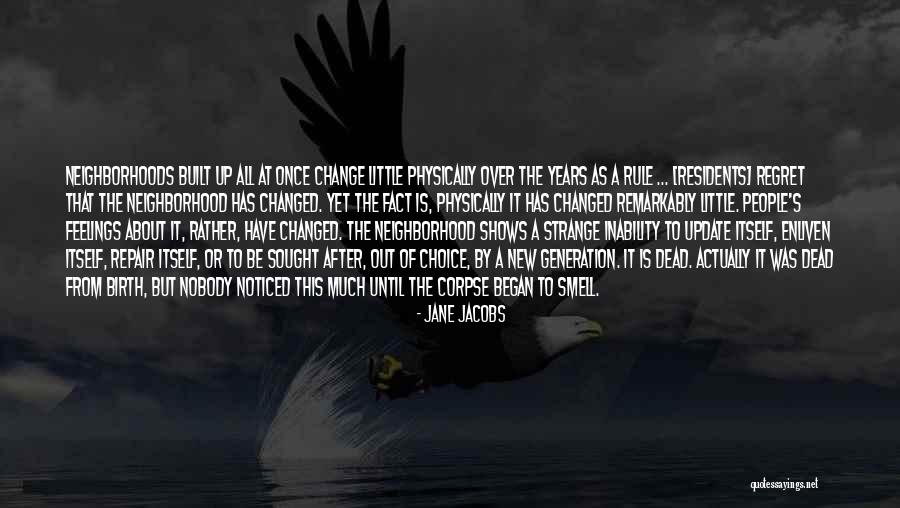
Neighborhoods built up all at once change little physically over the years as a rule ... [Residents] regret that the neighborhood has changed. Yet the fact is, physically it has changed remarkably little. People's feelings about it, rather, have changed. The neighborhood shows a strange inability to update itself, enliven itself, repair itself, or to be sought after, out of choice, by a new generation. It is dead. Actually it was dead from birth, but nobody noticed this much until the corpse began to smell. — Jane Jacobs
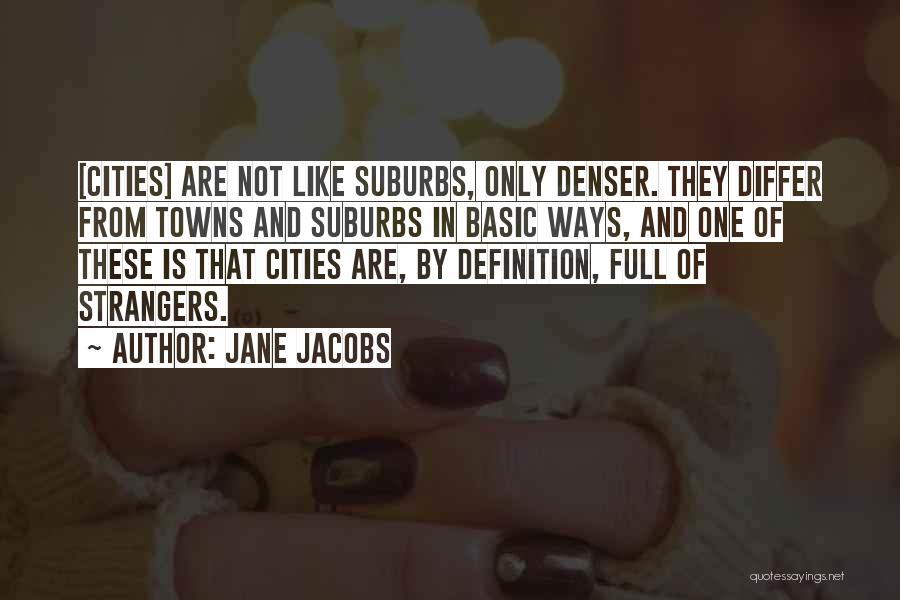
[Cities] are not like suburbs, only denser. They differ from towns and suburbs in basic ways, and one of these is that cities are, by definition, full of strangers. — Jane Jacobs
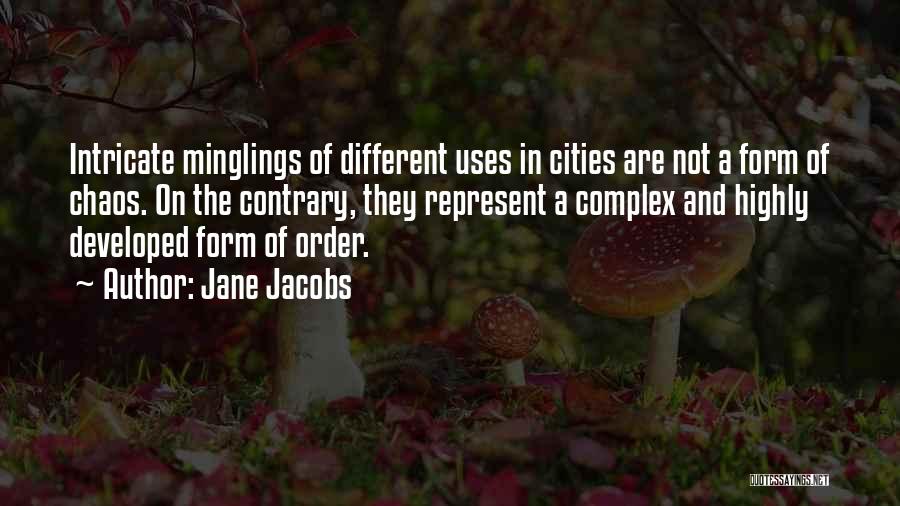
Intricate minglings of different uses in cities are not a form of chaos. On the contrary, they represent a complex and highly developed form of order. — Jane Jacobs
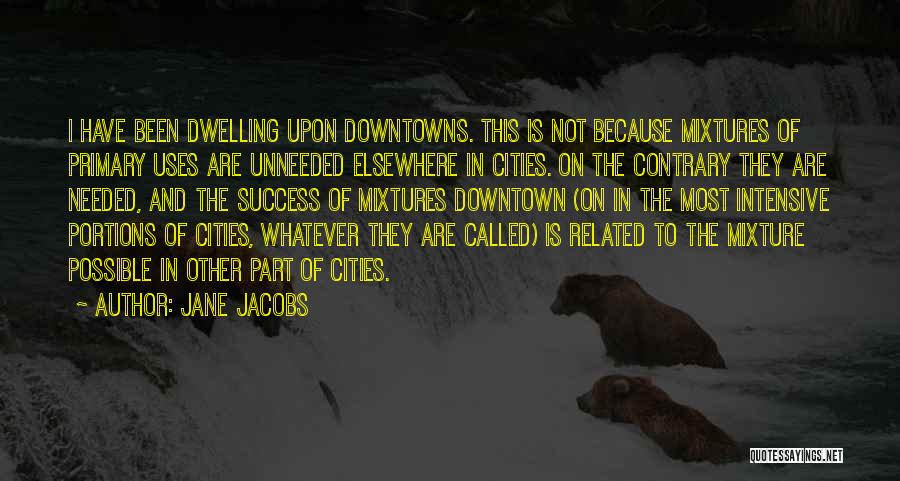
I have been dwelling upon downtowns. This is not because mixtures of primary uses are unneeded elsewhere in cities. On the contrary they are needed, and the success of mixtures downtown (on in the most intensive portions of cities, whatever they are called) is related to the mixture possible in other part of cities. — Jane Jacobs
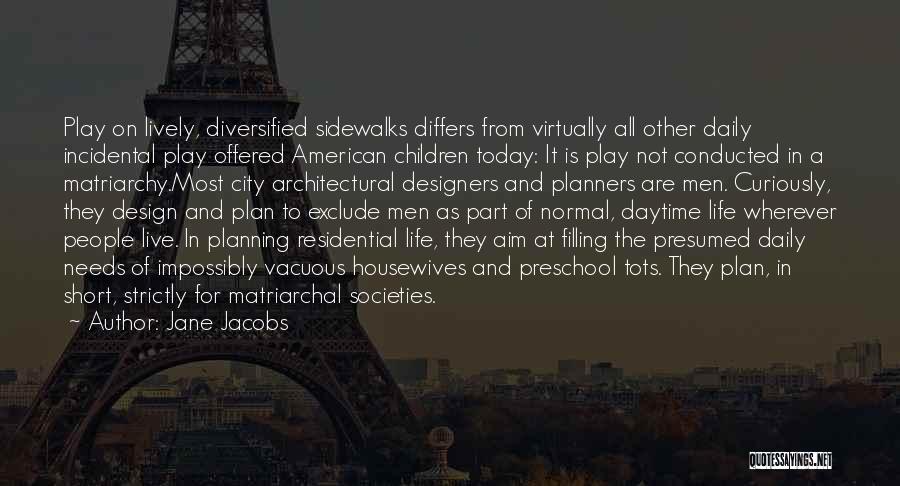
Play on lively, diversified sidewalks differs from virtually all other daily incidental play offered American children today: It is play not conducted in a matriarchy.
Most city architectural designers and planners are men. Curiously, they design and plan to exclude men as part of normal, daytime life wherever people live. In planning residential life, they aim at filling the presumed daily needs of impossibly vacuous housewives and preschool tots. They plan, in short, strictly for matriarchal societies. — Jane Jacobs
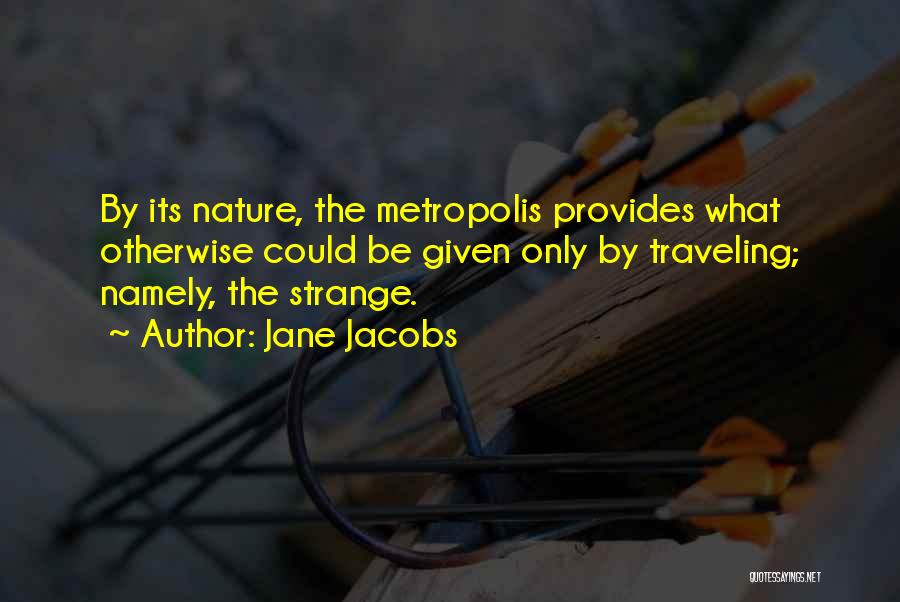
By its nature, the metropolis provides what otherwise could be given only by traveling; namely, the strange. — Jane Jacobs
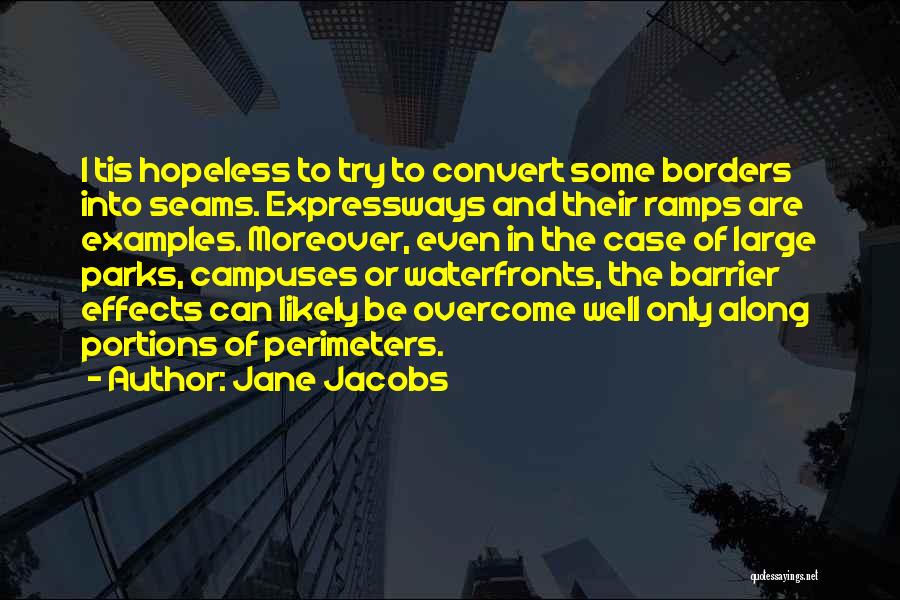
I tis hopeless to try to convert some borders into seams. Expressways and their ramps are examples. Moreover, even in the case of large parks, campuses or waterfronts, the barrier effects can likely be overcome well only along portions of perimeters. — Jane Jacobs
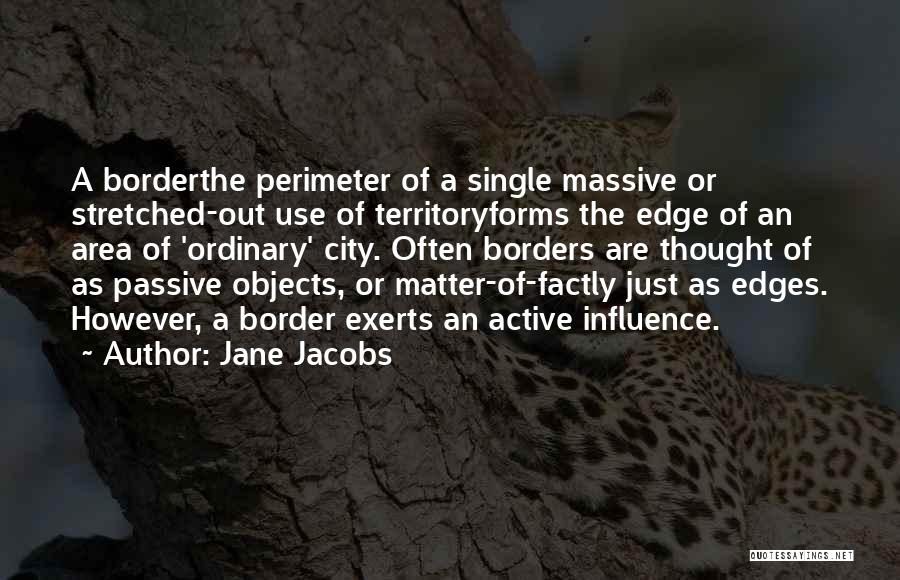
A border
the perimeter of a single massive or stretched-out use of territory
forms the edge of an area of 'ordinary' city. Often borders are thought of as passive objects, or matter-of-factly just as edges. However, a border exerts an active influence. — Jane Jacobs
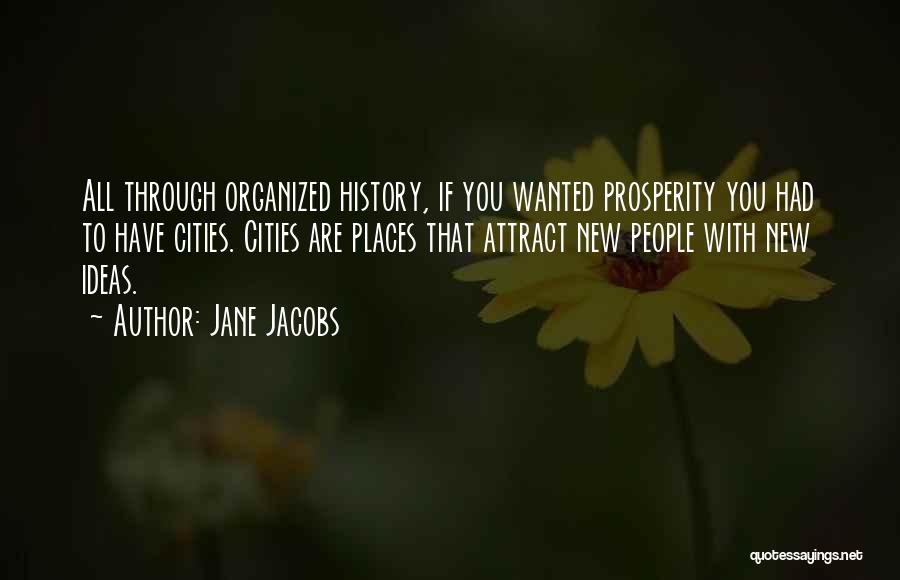
All through organized history, if you wanted prosperity you had to have cities. Cities are places that attract new people with new ideas. — Jane Jacobs
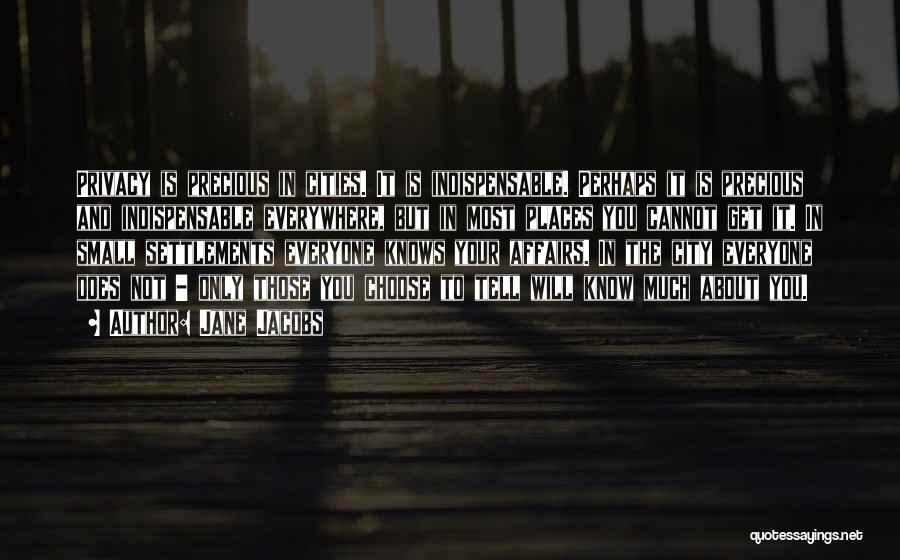
Privacy is precious in cities. It is indispensable. Perhaps it is precious and indispensable everywhere, but in most places you cannot get it. In small settlements everyone knows your affairs. In the city everyone does not - only those you choose to tell will know much about you. — Jane Jacobs
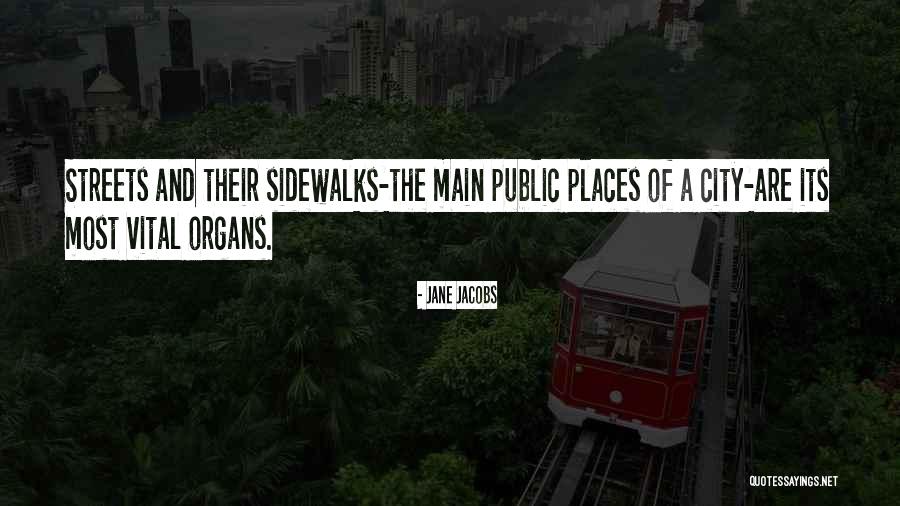
Streets and their sidewalks-the main public places of a city-are its most vital organs. — Jane Jacobs
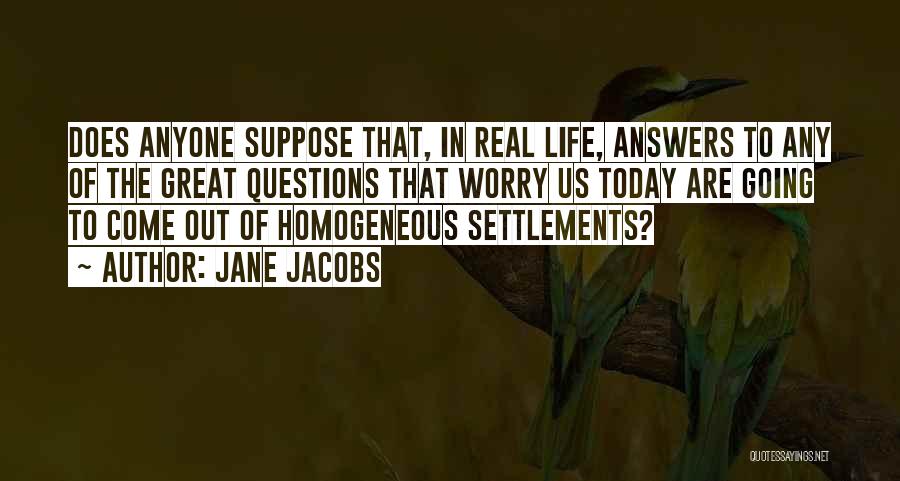
Does anyone suppose that, in real life, answers to any of the great questions that worry us today are going to come out of homogeneous settlements? — Jane Jacobs
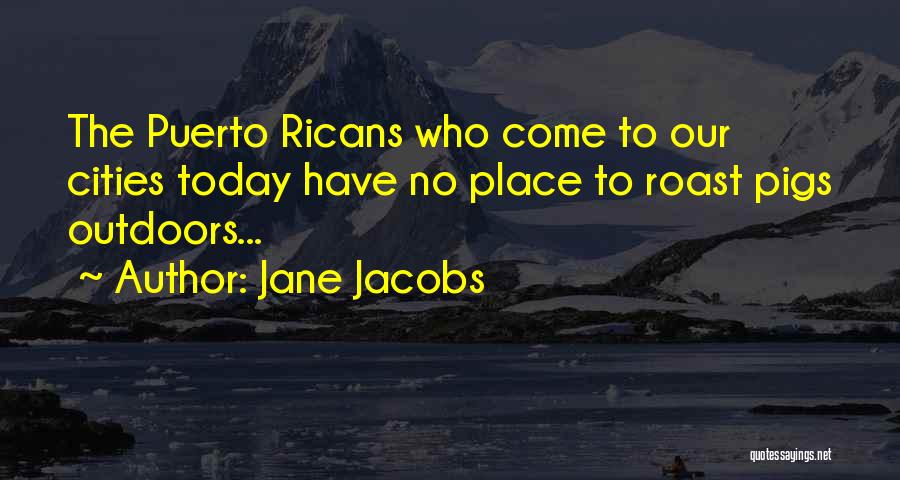
The Puerto Ricans who come to our cities today have no place to roast pigs outdoors... — Jane Jacobs
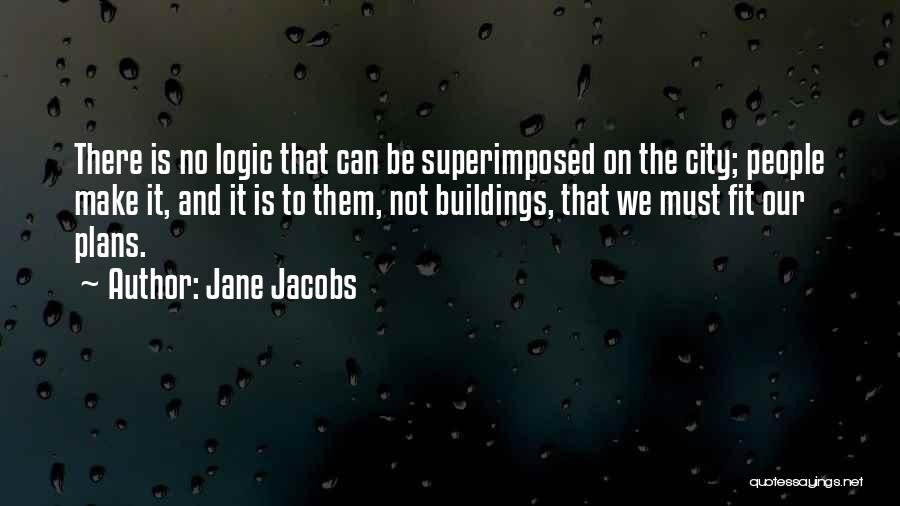
There is no logic that can be superimposed on the city; people make it, and it is to them, not buildings, that we must fit our plans. — Jane Jacobs
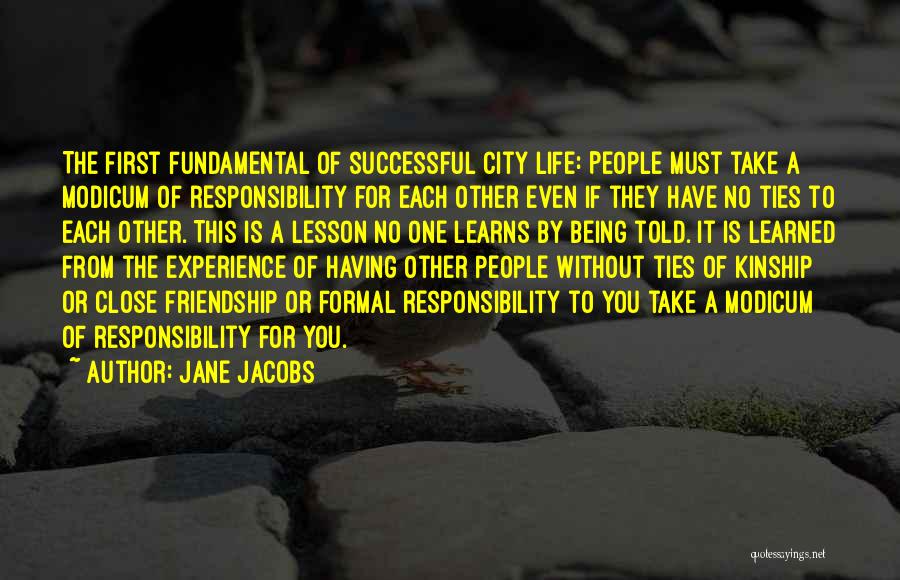
The first fundamental of successful city life: People must take a modicum of responsibility for each other even if they have no ties to each other. This is a lesson no one learns by being told. It is learned from the experience of having other people without ties of kinship or close friendship or formal responsibility to you take a modicum of responsibility for you. — Jane Jacobs
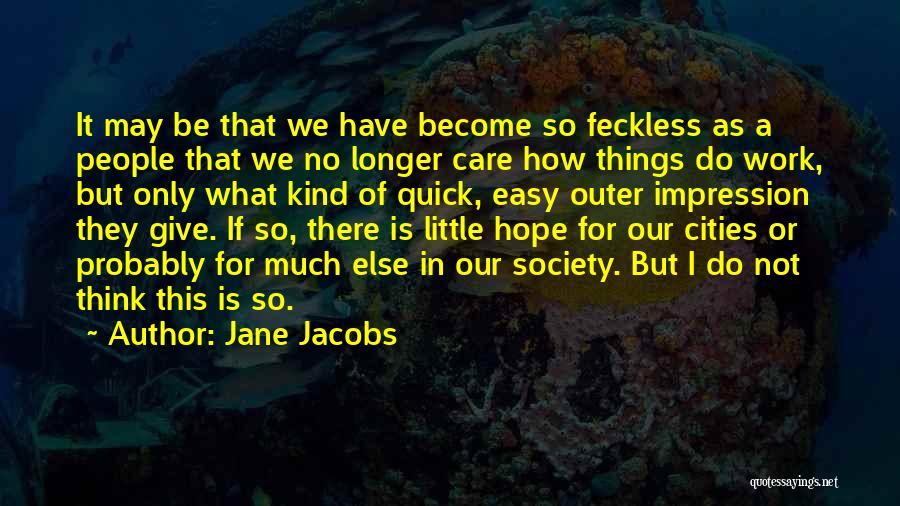
It may be that we have become so feckless as a people that we no longer care how things do work, but only what kind of quick, easy outer impression they give. If so, there is little hope for our cities or probably for much else in our society. But I do not think this is so. — Jane Jacobs
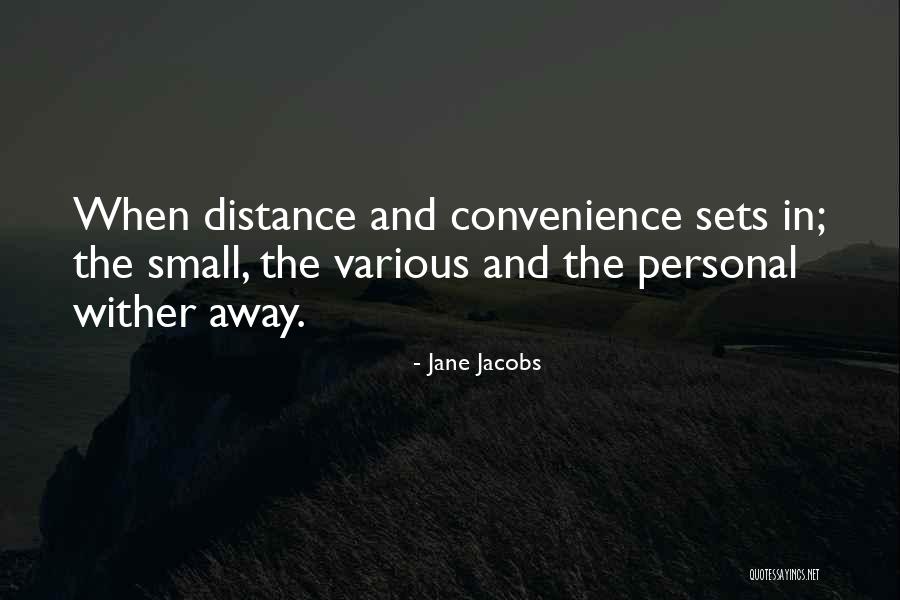
When distance and convenience sets in; the small, the various and the personal wither away. — Jane Jacobs
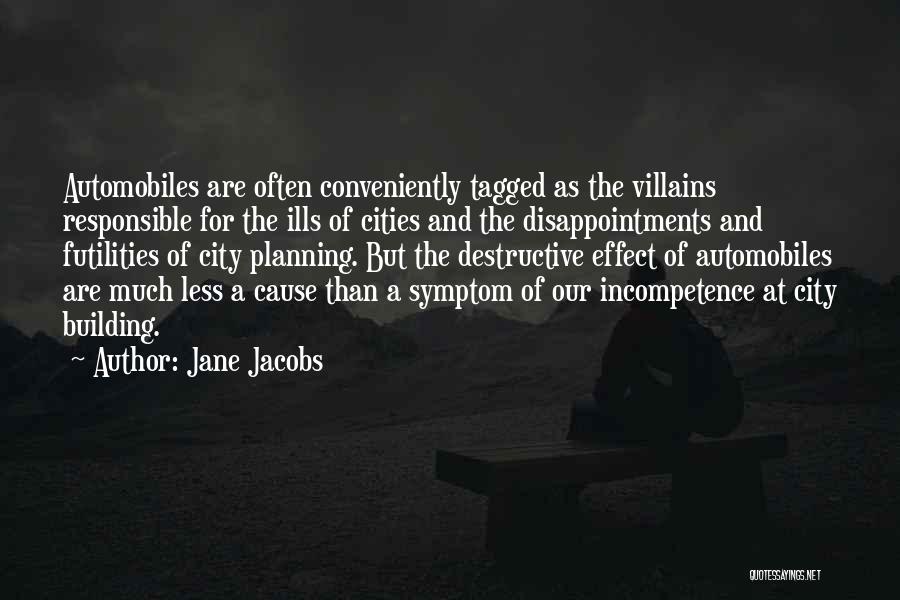
Automobiles are often conveniently tagged as the villains responsible for the ills of cities and the disappointments and futilities of city planning. But the destructive effect of automobiles are much less a cause than a symptom of our incompetence at city building. — Jane Jacobs
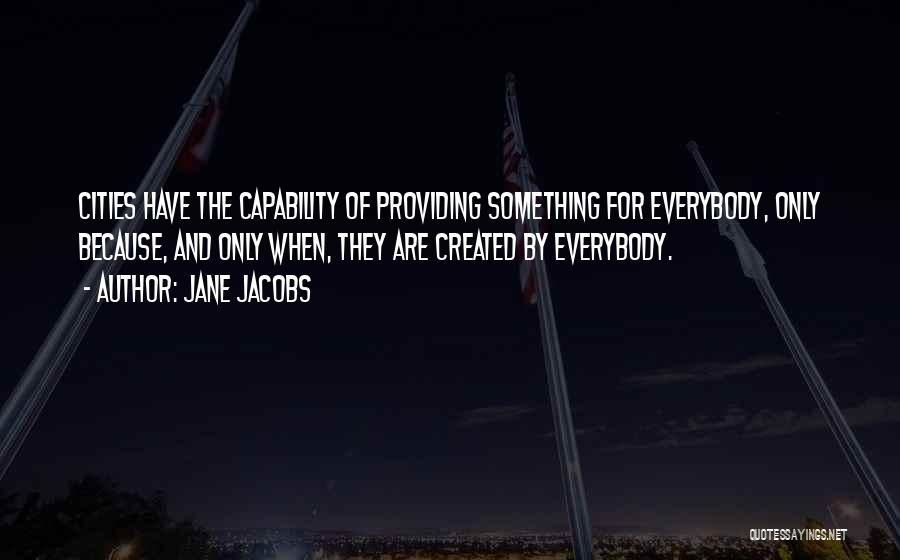
Cities have the capability of providing something for everybody, only because, and only when, they are created by everybody. — Jane Jacobs
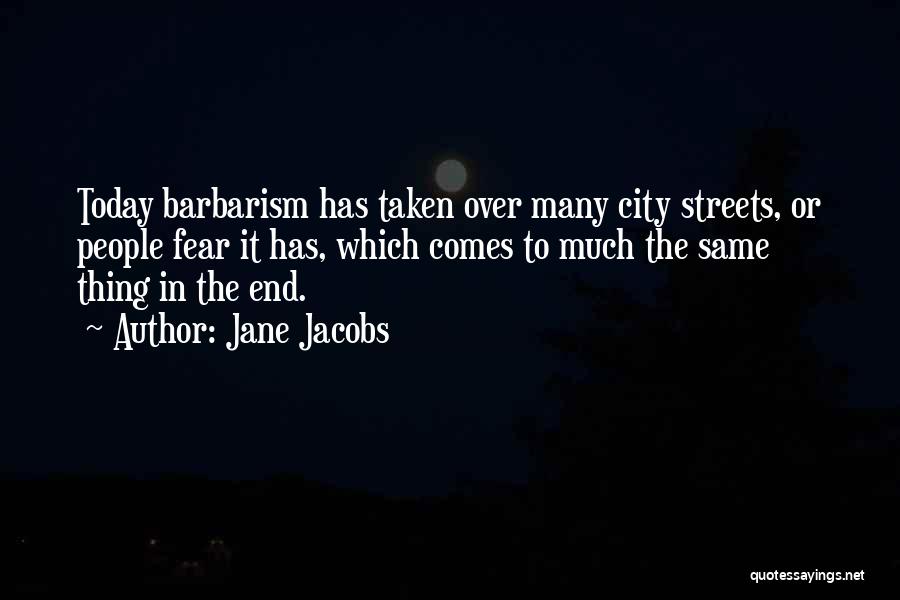
Today barbarism has taken over many city streets, or people fear it has, which comes to much the same thing in the end. — Jane Jacobs

[Public housing projects] are not lacking in natural leaders,' [Ellen Lurie, a social worker in East Harlem] says. 'They contain people with real ability, wonderful people many of them, but the typical sequence is that in the course of organization leaders have found each other, gotten all involved in each others' social lives, and have ended up talking to nobody but each other. They have not found their followers. Everything tends to degenerate into ineffective cliques, as a natural course. There is no normal public life. Just the mechanics of people learning what s going on is so difficult. It all makes the simplest social gain extra hard for these people. — Jane Jacobs
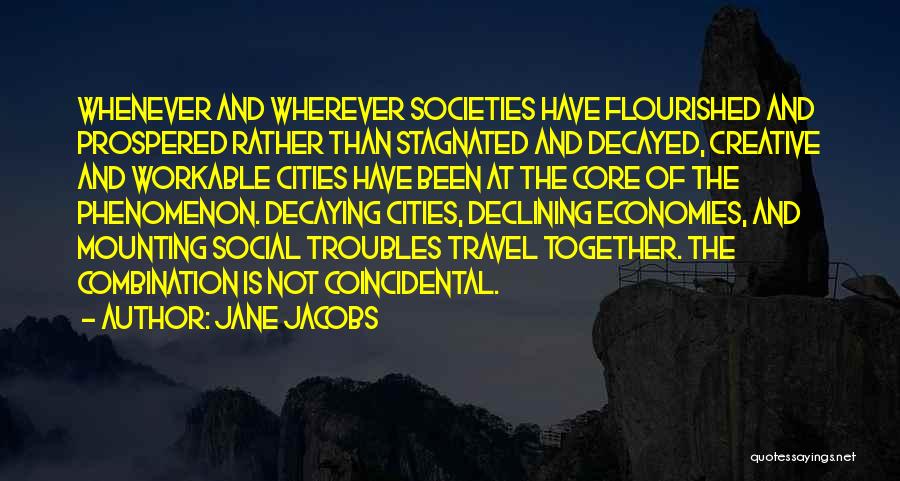
Whenever and wherever societies have flourished and prospered rather than stagnated and decayed, creative and workable cities have been at the core of the phenomenon. Decaying cities, declining economies, and mounting social troubles travel together. The combination is not coincidental. — Jane Jacobs
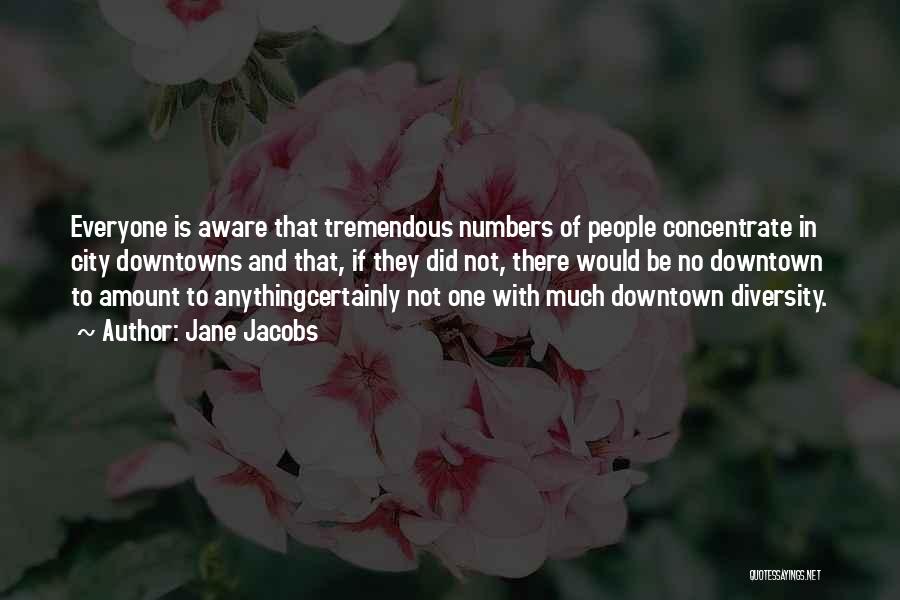
Everyone is aware that tremendous numbers of people concentrate in city downtowns and that, if they did not, there would be no downtown to amount to anything
certainly not one with much downtown diversity. — Jane Jacobs

Reformers have long observed city people loitering on busy corners, hanging around in candy stores and bars and drinking soda popon stoops, and have passed a judgment, the gist of which is: "This is deplorable! If these people had decent homes and a more private or bosky outdoor place, they wouldn't be on the street!" That judgment represents a profound misunderstanding of cities. It makes no more sense than to drop in at a testimonial banquet in a hotel and conclude that if these people had wives who could cook, they would give their parties at home. — Jane Jacobs
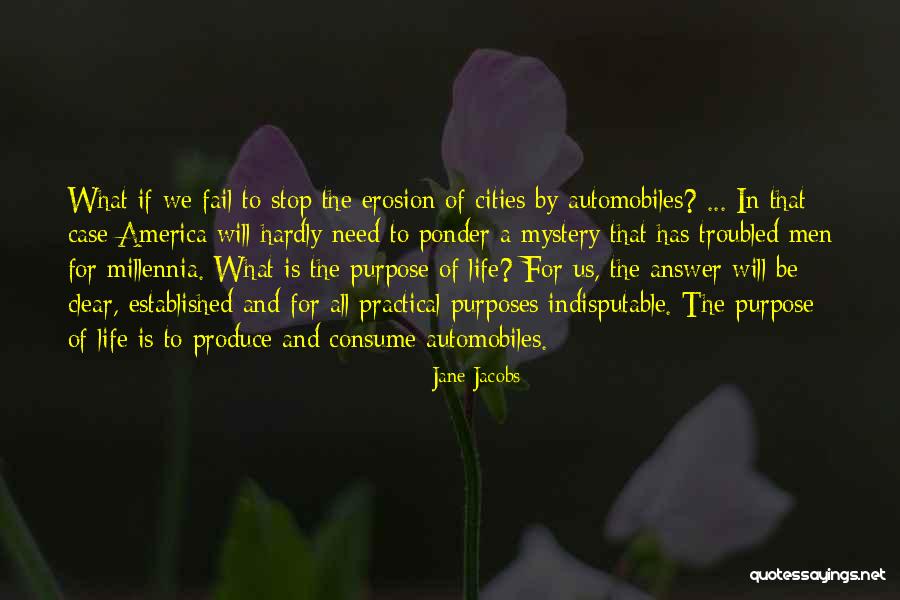
What if we fail to stop the erosion of cities by automobiles? ... In that case America will hardly need to ponder a mystery that has troubled men for millennia. What is the purpose of life? For us, the answer will be clear, established and for all practical purposes indisputable. The purpose of life is to produce and consume automobiles. — Jane Jacobs

Jane Jacobs observed in The Death and Life of Great American Cities: The larger a city, the greater the variety of its manufacturing, and also the greater both the number and the proportion of its small manufacturers. — Steven Johnson
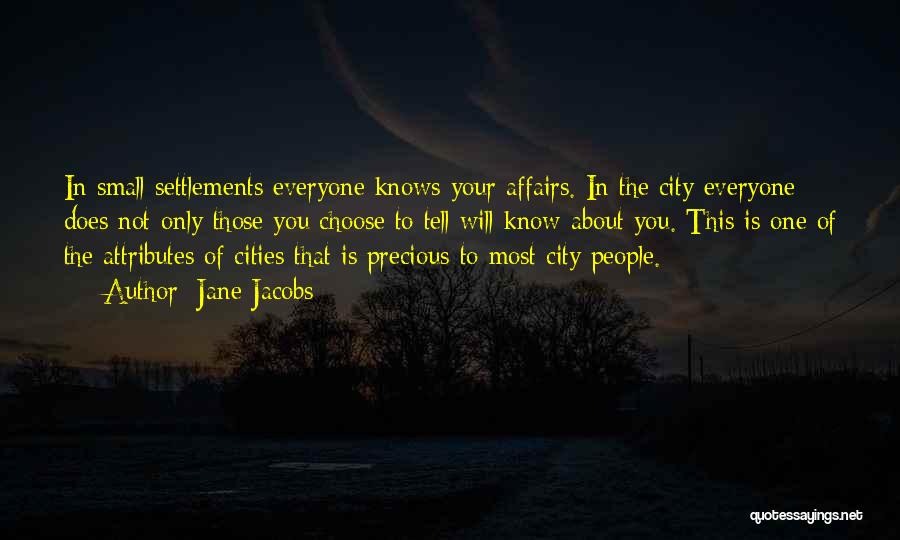
In small settlements everyone knows your affairs. In the city everyone does not-only those you choose to tell will know about you. This is one of the attributes of cities that is precious to most city people. — Jane Jacobs
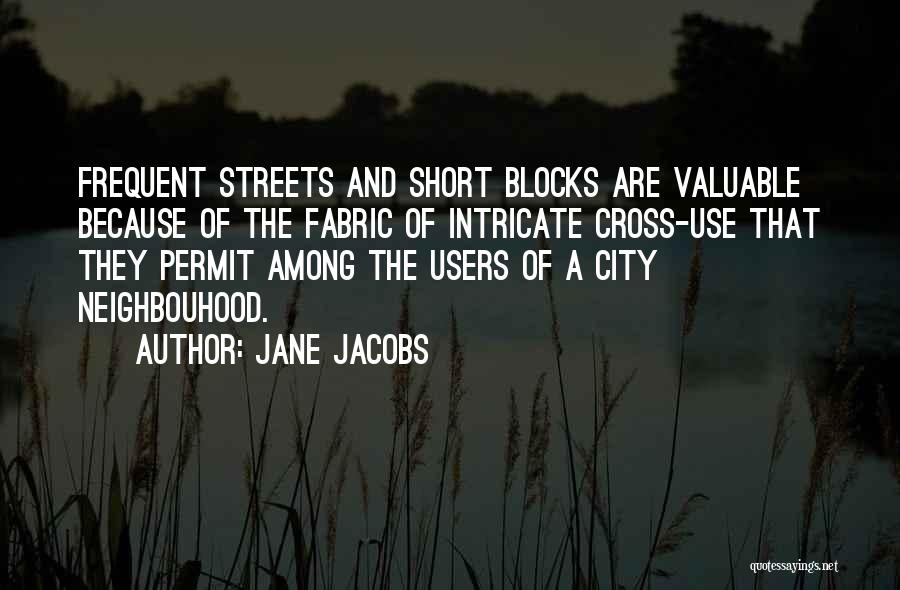
Frequent streets and short blocks are valuable because of the fabric of intricate cross-use that they permit among the users of a city neighbouhood. — Jane Jacobs
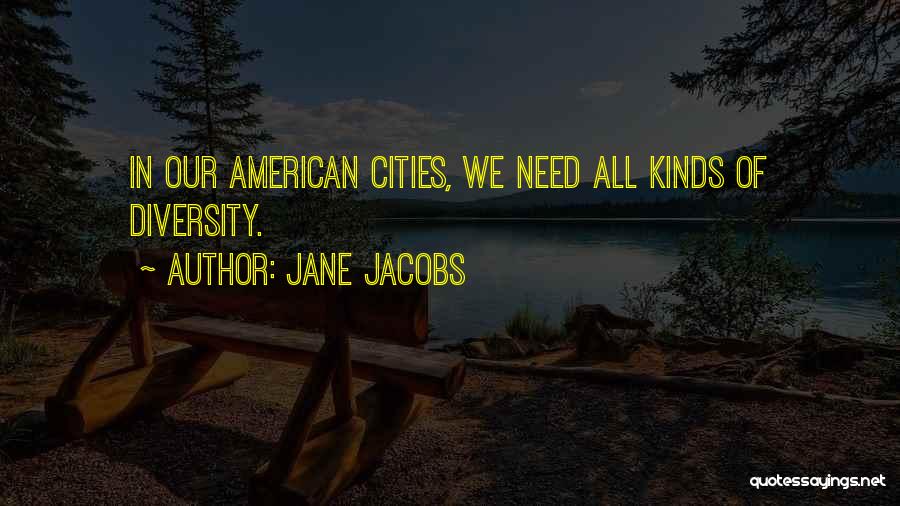
In our American cities, we need all kinds of diversity. — Jane Jacobs
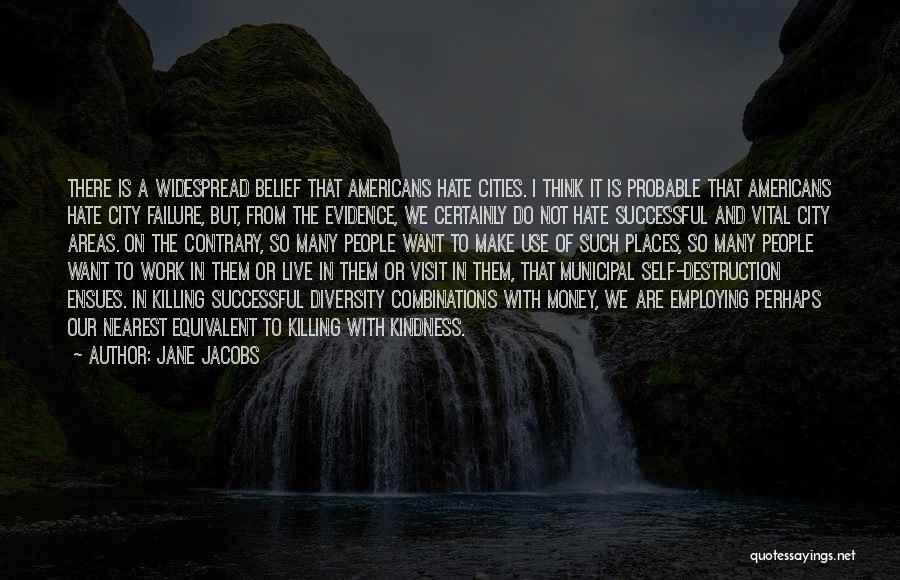
There is a widespread belief that americans hate cities. I think it is probable that Americans hate city failure, but, from the evidence, we certainly do not hate successful and vital city areas. On the contrary, so many people want to make use of such places, so many people want to work in them or live in them or visit in them, that municipal self-destruction ensues. In killing successful diversity combinations with money, we are employing perhaps our nearest equivalent to killing with kindness. — Jane Jacobs
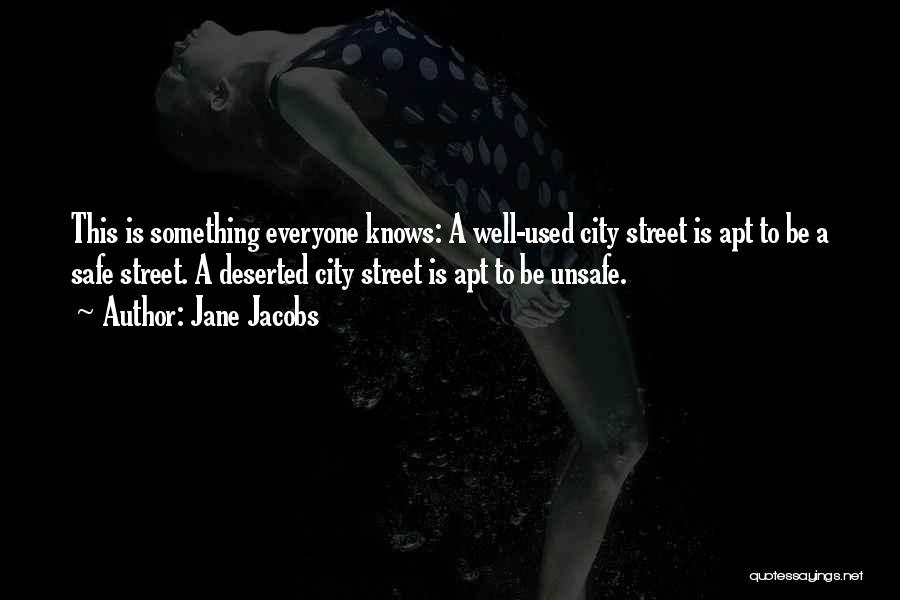
This is something everyone knows: A well-used city street is apt to be a safe street. A deserted city street is apt to be unsafe. — Jane Jacobs
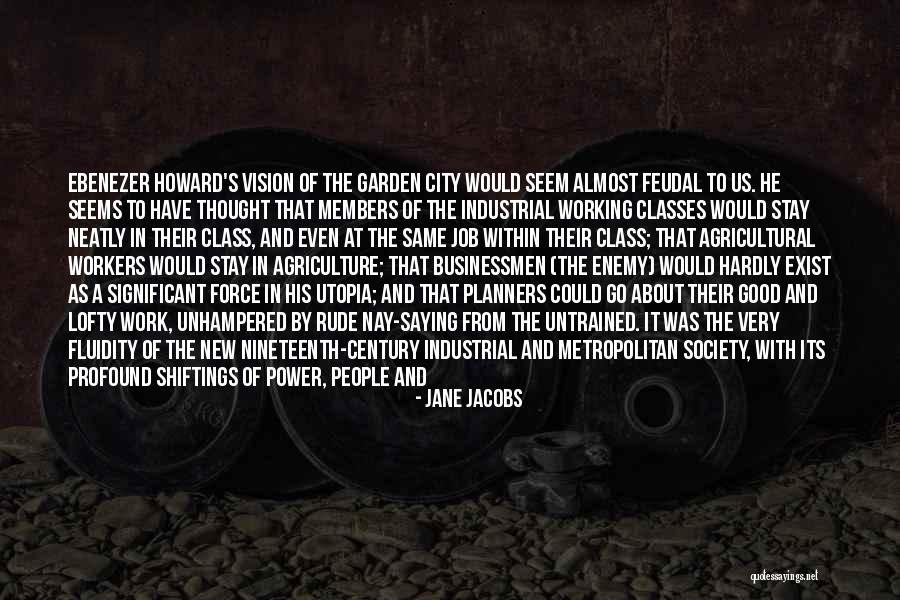
Ebenezer Howard's vision of the Garden City would seem almost feudal to us. He seems to have thought that members of the industrial working classes would stay neatly in their class, and even at the same job within their class; that agricultural workers would stay in agriculture; that businessmen (the enemy) would hardly exist as a significant force in his Utopia; and that planners could go about their good and lofty work, unhampered by rude nay-saying from the untrained. It was the very fluidity of the new nineteenth-century industrial and metropolitan society, with its profound shiftings of power, people and money, that agitated Howard so deeply — Jane Jacobs
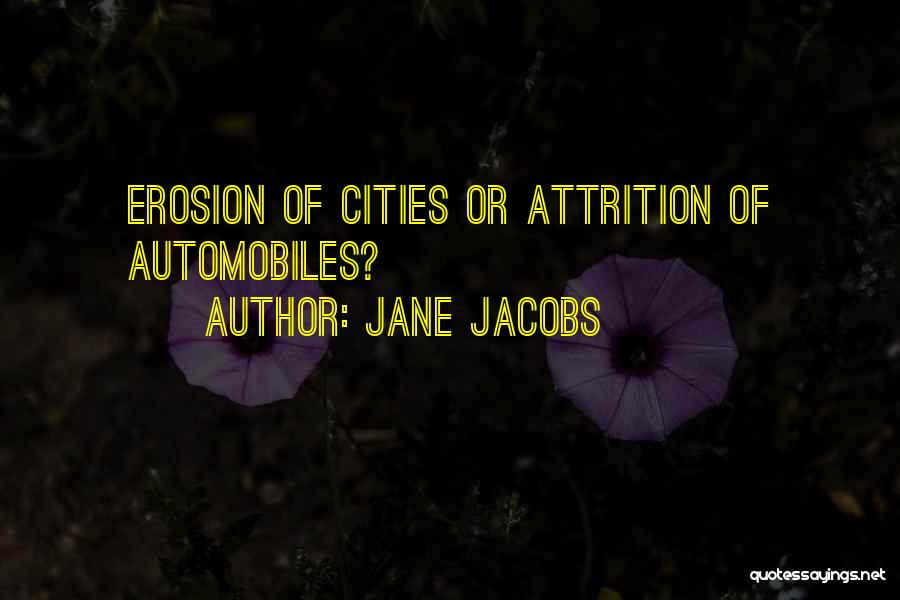
Erosion of cities or attrition of automobiles? — Jane Jacobs
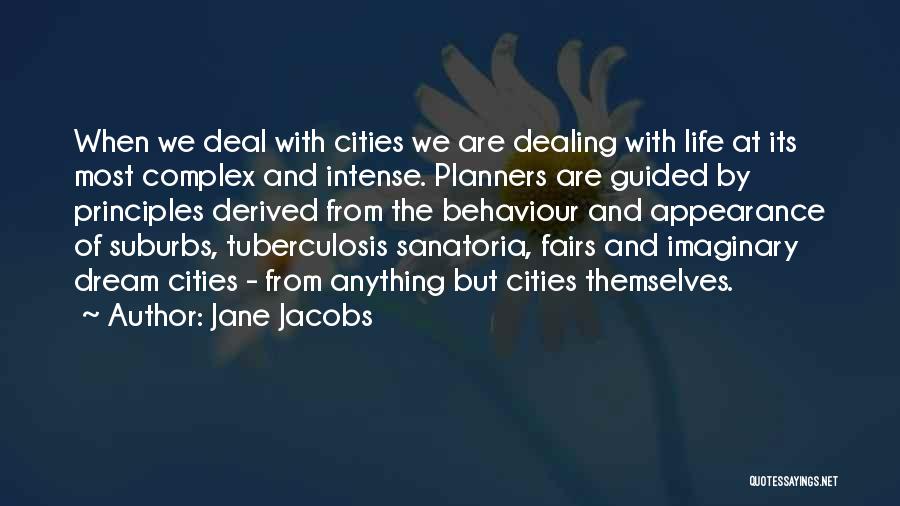
When we deal with cities we are dealing with life at its most complex and intense. Planners are guided by principles derived from the behaviour and appearance of suburbs, tuberculosis sanatoria, fairs and imaginary dream cities - from anything but cities themselves. — Jane Jacobs
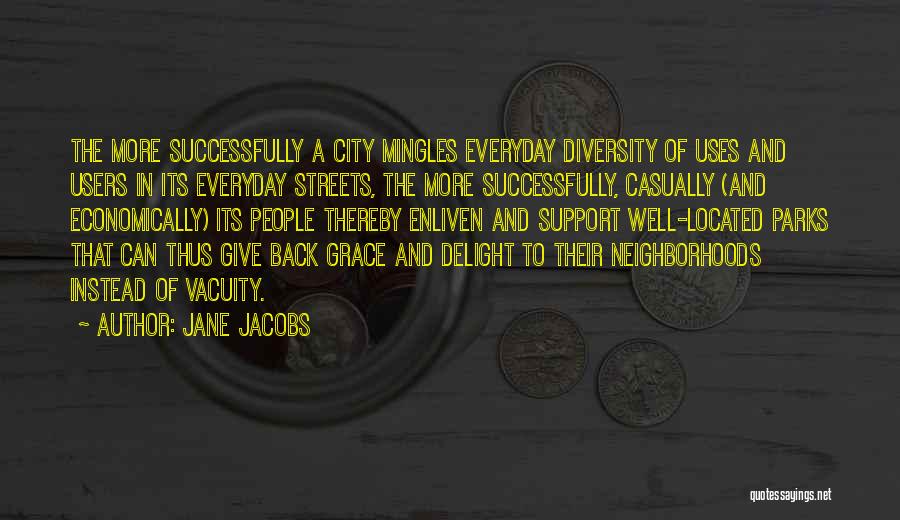
The more successfully a city mingles everyday diversity of uses and users in its everyday streets, the more successfully, casually (and economically) its people thereby enliven and support well-located parks that can thus give back grace and delight to their neighborhoods instead of vacuity. — Jane Jacobs
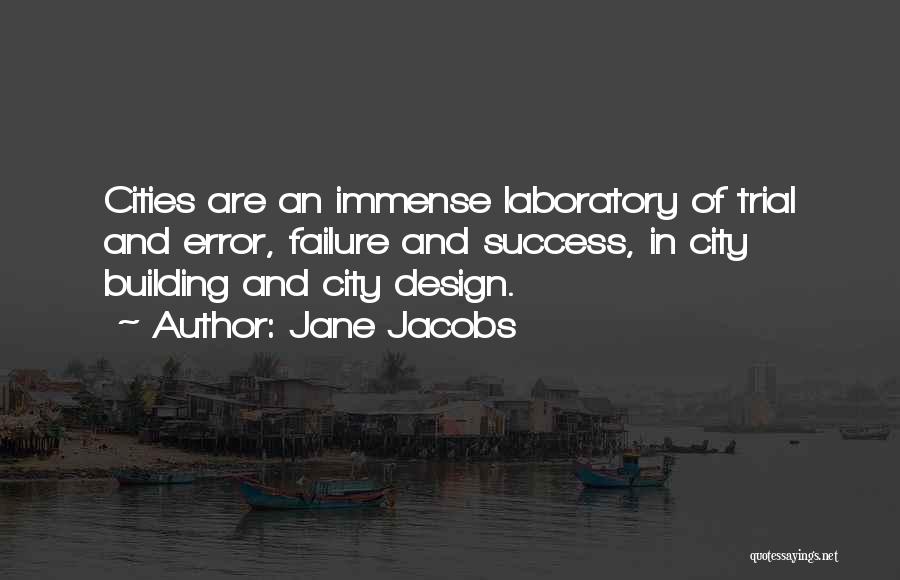
Cities are an immense laboratory of trial and error, failure and success, in city building and city design. — Jane Jacobs
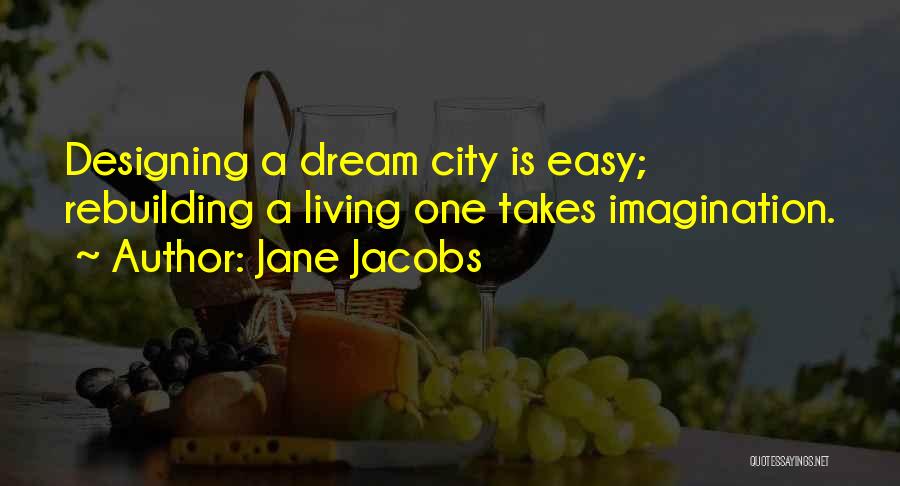
Designing a dream city is easy; rebuilding a living one takes imagination. — Jane Jacobs
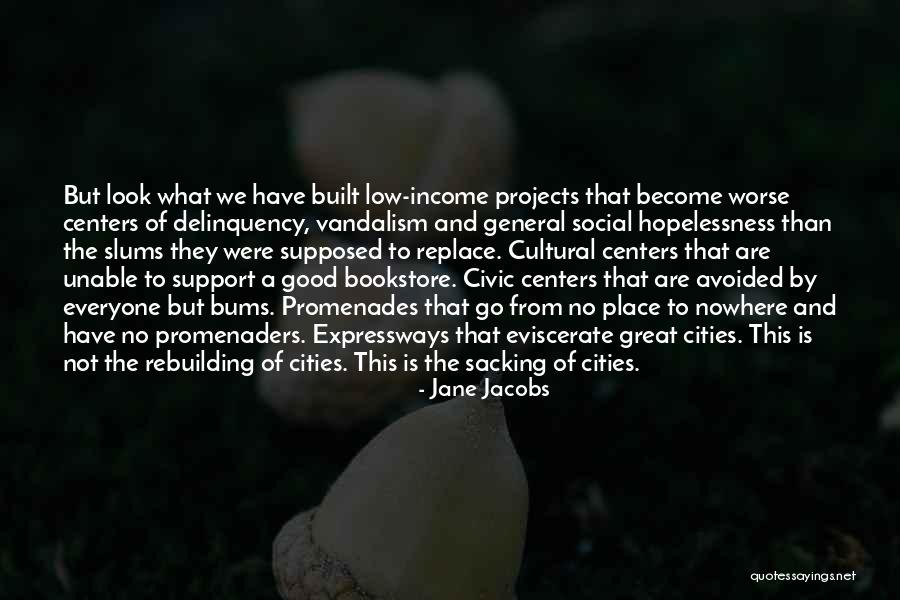
But look what we have built low-income projects that become worse centers of delinquency, vandalism and general social hopelessness than the slums they were supposed to replace. Cultural centers that are unable to support a good bookstore. Civic centers that are avoided by everyone but bums. Promenades that go from no place to nowhere and have no promenaders. Expressways that eviscerate great cities. This is not the rebuilding of cities. This is the sacking of cities. — Jane Jacobs
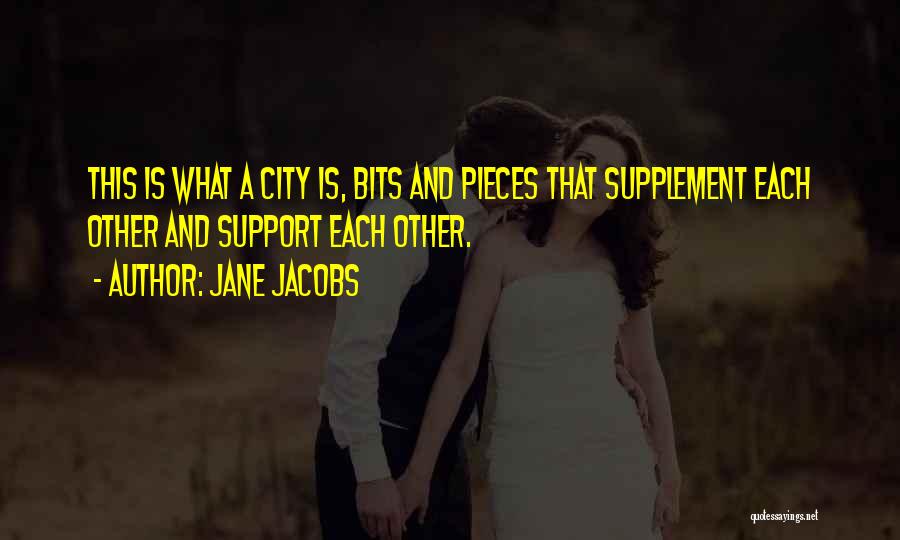
This is what a city is, bits and pieces that supplement each other and support each other. — Jane Jacobs
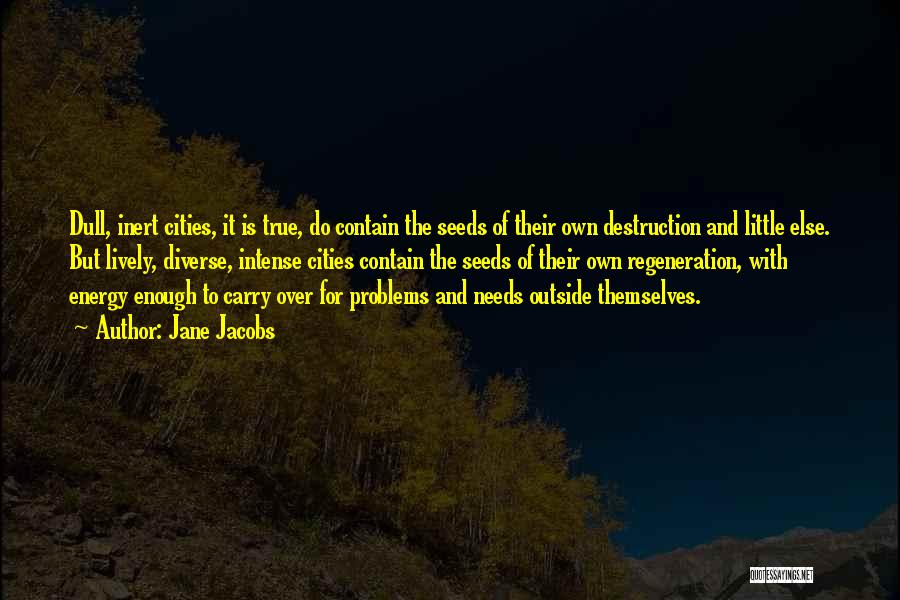
Dull, inert cities, it is true, do contain the seeds of their own destruction and little else. But lively, diverse, intense cities contain the seeds of their own regeneration, with energy enough to carry over for problems and needs outside themselves. — Jane Jacobs
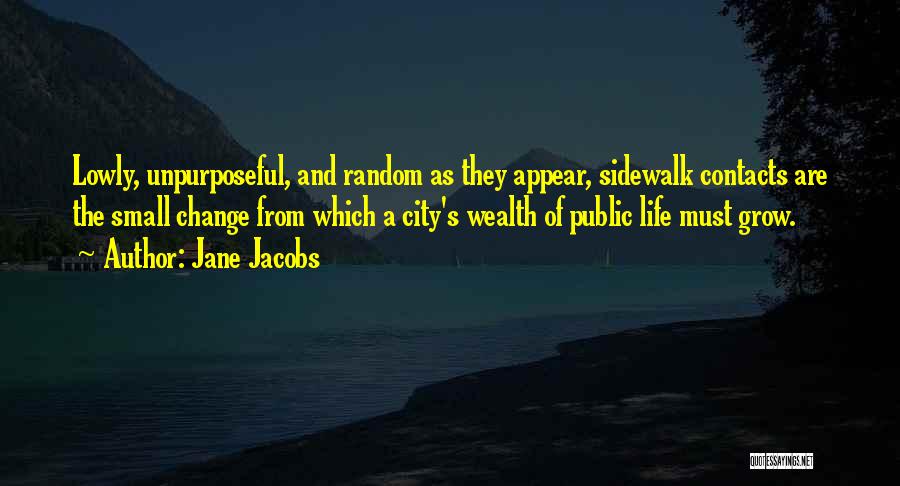
Lowly, unpurposeful, and random as they appear, sidewalk contacts are the small change from which a city's wealth of public life must grow. — Jane Jacobs
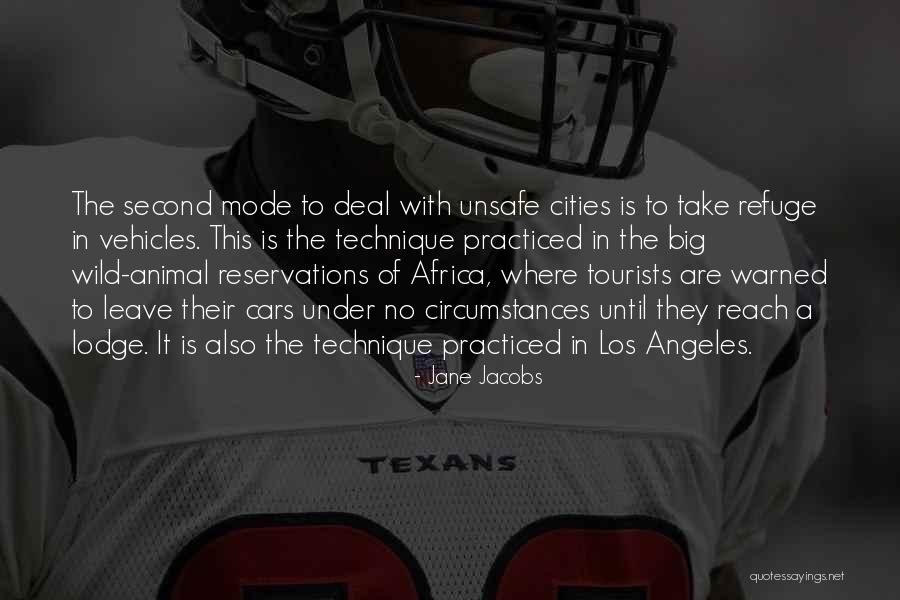
The second mode to deal with unsafe cities is to take refuge in vehicles. This is the technique practiced in the big wild-animal reservations of Africa, where tourists are warned to leave their cars under no circumstances until they reach a lodge. It is also the technique practiced in Los Angeles. — Jane Jacobs
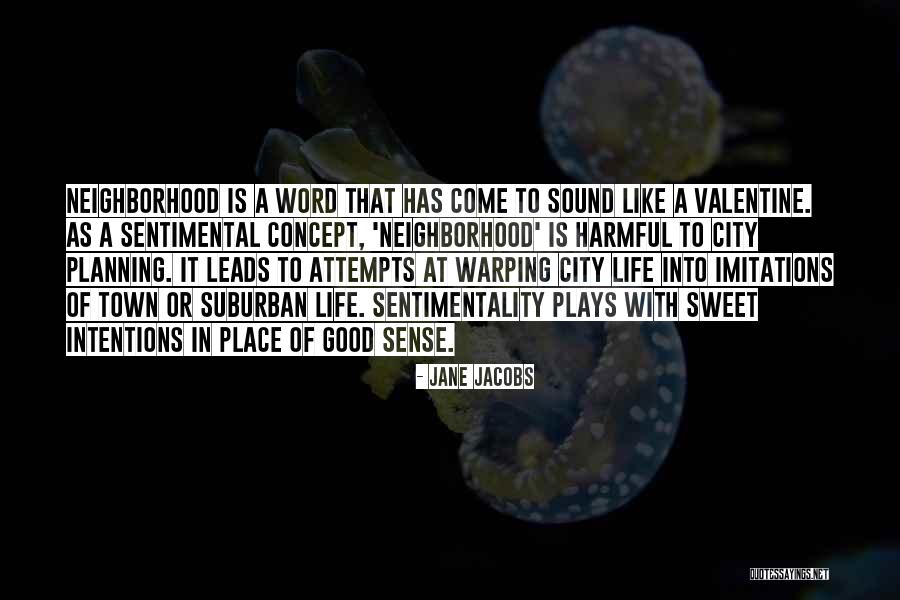
Neighborhood is a word that has come to sound like a Valentine. As a sentimental concept, 'neighborhood' is harmful to city planning. It leads to attempts at warping city life into imitations of town or suburban life. Sentimentality plays with sweet intentions in place of good sense. — Jane Jacobs
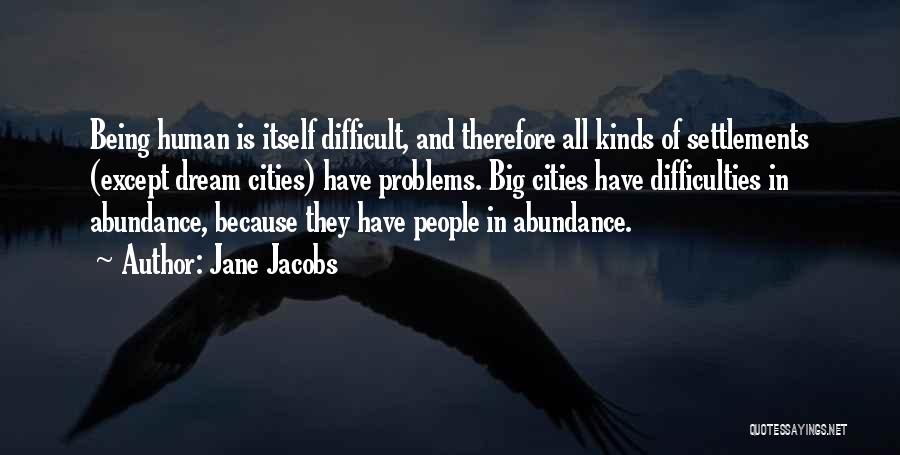
Being human is itself difficult, and therefore all kinds of settlements (except dream cities) have problems. Big cities have difficulties in abundance, because they have people in abundance. — Jane Jacobs
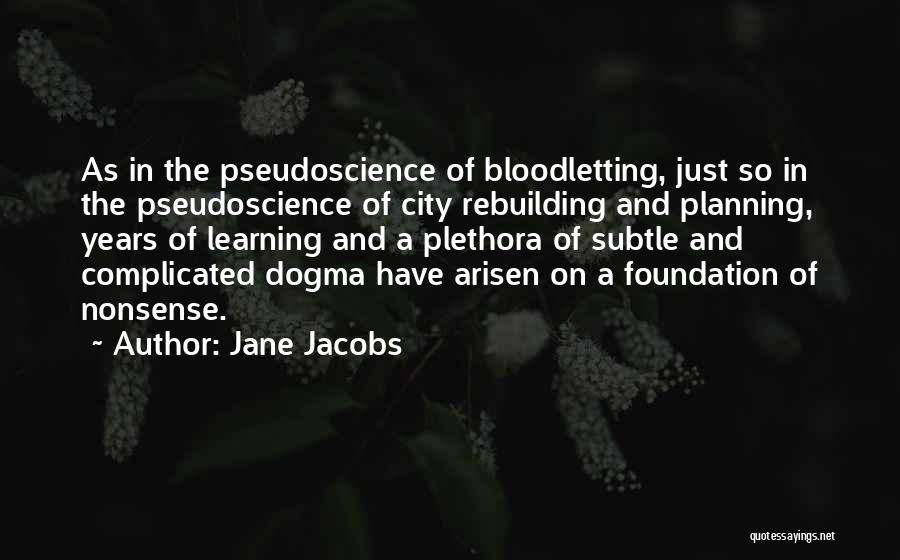
As in the pseudoscience of bloodletting, just so in the pseudoscience of city rebuilding and planning, years of learning and a plethora of subtle and complicated dogma have arisen on a foundation of nonsense. — Jane Jacobs
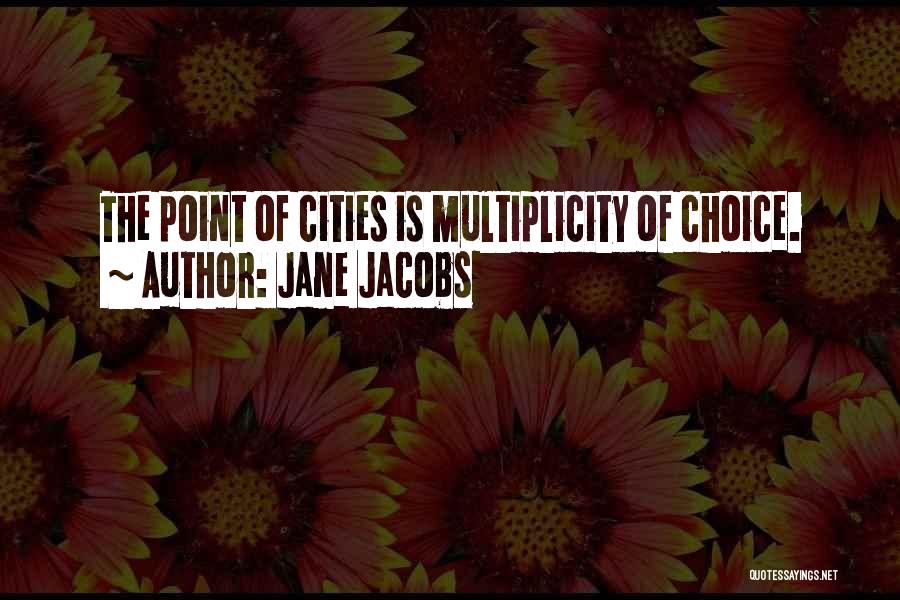
The point of cities is multiplicity of choice. — Jane Jacobs
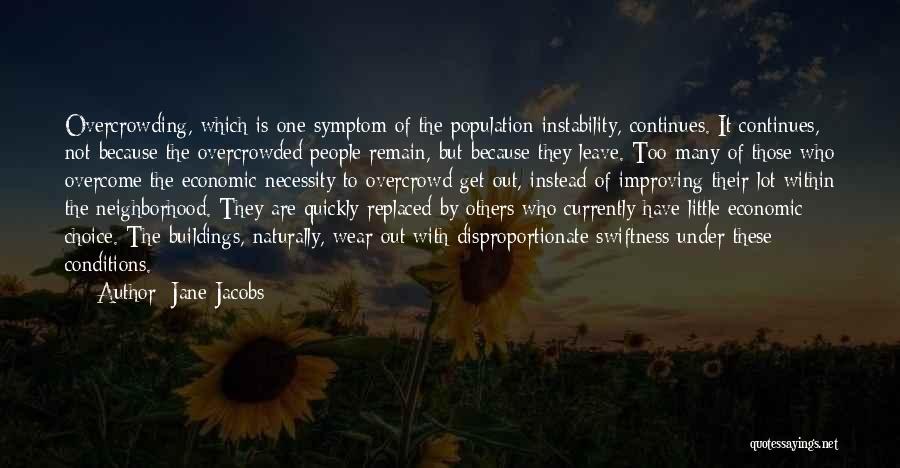
Overcrowding, which is one symptom of the population instability, continues. It continues, not because the overcrowded people remain, but because they leave. Too many of those who overcome the economic necessity to overcrowd get out, instead of improving their lot within the neighborhood. They are quickly replaced by others who currently have little economic choice. The buildings, naturally, wear out with disproportionate swiftness under these conditions. — Jane Jacobs
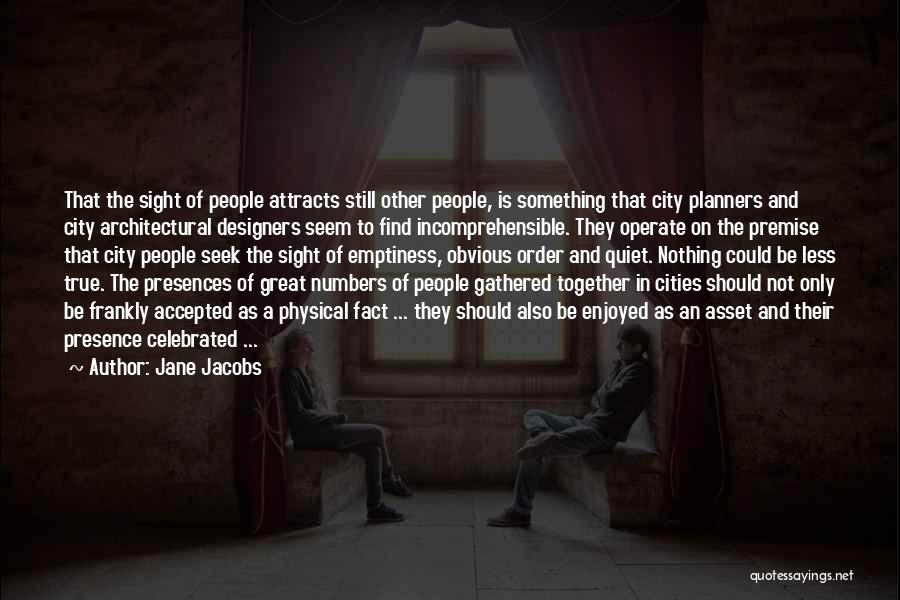
That the sight of people attracts still other people, is something that city planners and city architectural designers seem to find incomprehensible. They operate on the premise that city people seek the sight of emptiness, obvious order and quiet. Nothing could be less true. The presences of great numbers of people gathered together in cities should not only be frankly accepted as a physical fact ... they should also be enjoyed as an asset and their presence celebrated ... — Jane Jacobs
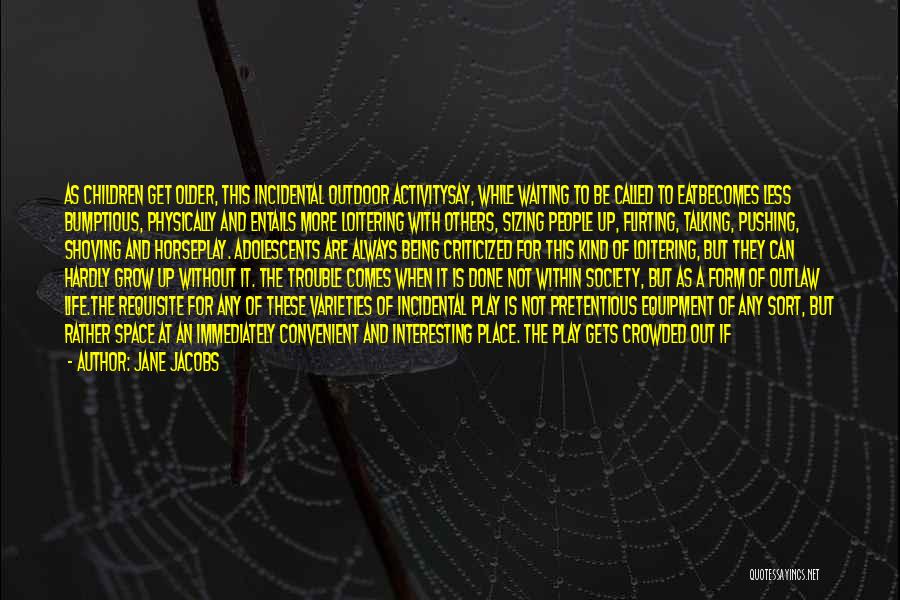
As children get older, this incidental outdoor activity
say, while waiting to be called to eat
becomes less bumptious, physically and entails more loitering with others, sizing people up, flirting, talking, pushing, shoving and horseplay. Adolescents are always being criticized for this kind of loitering, but they can hardly grow up without it. The trouble comes when it is done not within society, but as a form of outlaw life.
The requisite for any of these varieties of incidental play is not pretentious equipment of any sort, but rather space at an immediately convenient and interesting place. The play gets crowded out if sidewalks are too narrow relative to the total demands put on them. It is especially crowded out if the sidewalks also lack minor irregularities in building line. An immense amount of both loitering and play goes on in shallow sidewalk niches out of the line of moving pedestrian feet. — Jane Jacobs






